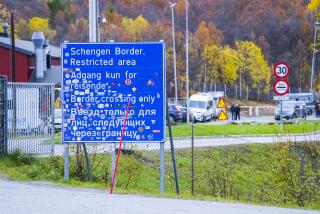U.S. May Punish Israel for Building Fence in W. Bank
WASHINGTON — The Bush administration is preparing to notify Israel that it may reduce recently approved loan guarantees in proportion to the amount Israel spends on a new security fence and on Jewish settlements, U.S. officials said Monday.
The move, meant to make clear the administration’s objections to the fact that the fence is being built partly inside the West Bank, would mark a rare instance of Washington penalizing Israel for its policies.
The administration also fears that the construction violates the spirit of the “road map” peace plan.
National security advisor Condoleezza Rice is expected to let senior officials in Prime Minister Ariel Sharon’s government know in a telephone conversation, possibly as early as today, that the United States does not intend to provide resources that will help Israel implement a policy Washington opposes.
“We’ve made clear to the Israelis in public and private settings that the fence is a concern. And we’ve had many conversations at a variety of levels, including the highest levels, about the fence,” said National Security Council spokesman Michael Anton.
Pressed on whether the United States is on the verge of imposing a financial penalty on Israel, Anton said, “We’re always reviewing our policy with an eye toward making more progress toward peace and encouraging the parties to meet their obligations.”
The 370-mile fence, called a “wall of separation” and an “apartheid wall” by Palestinians, is meant to divide Israel from the West Bank.
Washington says Israel has the right to erect the fence to keep out attackers, but it takes issue with the routing.
To protect Jewish settlements, the fence dips deep into the West Bank, encircling and isolating Palestinian villages and dividing properties and farmland in ways that make them inaccessible to their owners, U.S. officials say.
Palestinians say they fear that the path of the fence is meant to mark Israel’s view of where the border between a Jewish and a Palestinian state should lie.
The first section of the barrier, which is in some parts concrete and in others a wire fence with electronic monitors, was completed last week.
Like past financial aid agreements, the recent package of $9 billion in loan guarantees approved by Congress stipulates that the United States can deduct money spent on settlements or security activities in Palestinian areas.
Reducing the new loan guarantees would reprimand Israel for building the fence partly in the West Bank, in what the White House sees as a violation of the terms of aid as well as the spirit of the peace plan.
The fence has caused rare friction between Israel and an administration that Israeli officials and American Jews have generally viewed as extraordinarily supportive of Israel. President Bush and Sharon have forged a close relationship since the Sept. 11 attacks.
But Bush also has expressed a deep commitment to the implementation of the peace plan, which was designed jointly by the United States, the United Nations, the European Union and Russia and was unveiled by Bush in April.
Israel said Monday that the United States had not linked cash support for Israel and the fence in recent negotiations. “This was never raised in discussions -- someone in the State Department has an ax to grind and issued this statement, but it doesn’t reflect official policy,” Sharon advisor Raanan Gissin said. “This is a rumor, a trial balloon, whatever.”
He also said the fence was intended only to limit the movement of suicide bombers. “The fence is a constraint, it’s a necessity. It’s not a choice,” Gissin said. “You don’t put a dollar figure on saving human life.”
The administration is working on a formula that would determine how much to deduct from the loan guarantee package, U.S. officials said Monday.
The first section of the fence cost approximately $300 million, and no firm estimate for the full project exists. One estimate projected a cost of about $2 million per mile.
In addition to penalizing Israel for the fence, the United States is considering deducting funds from the loan guarantees for money Israel spends on bypass roads, built to route Jewish settlers around Palestinian towns and villages.
In the past, Israel has successfully argued that no money should be deducted for the roads, because they are necessary for security and preserving the peace.
The U.S. has considered deducting $50 million from the loan guarantees, U.S. officials said. But the figure might end up being much higher if the costs of the bypass roads are included, they said.
“If that’s the case, then it’s not a slight warning shot across the bow. It would be a broadside right through the hull of the ship,” said an administration official who requested anonymity.
Although work on the fence began last year, it became a tinderbox only in recent weeks after strenuous protests by the new Palestinian government.
In talks with both Sharon and Palestinian Prime Minister Mahmoud Abbas last month, Bush repeatedly stated that the United States was troubled by the Israeli barrier.
“Where the president has a problem -- is when the fence is no longer just on your land but because of the way it’s being designed or built, it starts to infringe and take over Palestinian land,” Secretary of State Colin L. Powell said in an interview with Israel’s Maariv newspaper that was released Friday.
“You see it going in ways that will make it very difficult to get to the next phases of the road map,” he said.
*
Times staff writer Megan K. Stack in Jerusalem contributed to this report.
More to Read
Sign up for Essential California
The most important California stories and recommendations in your inbox every morning.
You may occasionally receive promotional content from the Los Angeles Times.









